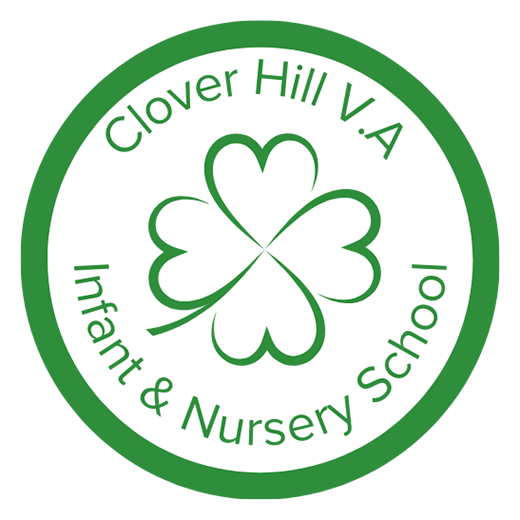Welcome to the Early Years Foundation Stage At Clover Hill. We pride ourselves on delivering a curriculum full of enriching experiences and practical learning that will motivate and inspire our children.
The school has adopted Norfolk’s Policy on equal opportunities that ensures all children have access to a broad and balanced curriculum.
Nursery (FS1) and Reception (FS2) children follow the Early Years Foundation Stage Statutory Framework for group and school-based providers (2024) which identifies Early Learning Goals and sets the standards that all early years’ providers must meet to ensure that children learn and develop well and are kept healthy and safe. We use our own curriculum overview to track progress and attainment – click below to see.
Children will work towards achieving these goals by the end of their Reception year. The children progress towards these goals by way of a series of developmental phases, and planned learning opportunities are linked to these steps.
We strive to provide every unique child with confidence, independence and resilience through positive relationships. Through a play-based curriculum, your child will have the opportunity to develop and use intellectual, communication, social, and physical skills. The children will also be given an opportunity to take part in a variety of outdoor activities on a daily basis.
Children learn and develop well in enabling environments with teaching and support from adults, who respond to their individual interests and needs and help them to build their learning over time. They develop and learn at different rates, this framework covers the education and care of all children in early years’ provision, including children with special educational needs and disabilities (SEND).
The learning for Foundation Stage children is divided into seven areas, 3 prime areas and 4 specific areas.
Prime Areas
Communication and Language:
(Listening, Attention and Understanding)
The development of children’s spoken language underpins all seven areas of learning and development. Children will be encouraged to practice, extend and enrich their range of vocabulary and the communication skills they have. Teaches will support and model communication, providing them with extensive opportunities to use and embed new words in a range of contexts and situations. The children will also be supported to develop their listening skills.
Personal, Social and Emotional Development:
(Self-regulation, Managing Self and Building Relationships)
Children will be supported to manage emotions, to take turns and share, to develop confidence and independence. Through adult modelling and guidance, they will learn how to look after their bodies, including healthy eating, and manage personal needs independently. Through supported interaction with other children, they learn how to make good friendships, to be sensitive to the needs and feelings of others, to treat living things, property and the environment with care and concern. This enables children to learn how to understand their own feelings and those of others.
Physical Development:
(Fine motor skills and Gross motor skills)
Children will be able to improve their fine motor and co-ordination skills by using a range of equipment, materials, and tools which encourage children to develop proficiency, control and confidence. Gross motor development will be supported through running, jumping, climbing, balancing, and using large and small apparatus, which will encourage them to develop their core strength, stability, balance, spatial awareness, co-ordination and agility. Children will begin to understand how their bodies work and what they need to do to be healthy and safe.
Specific Areas
Literacy:
(Word Reading, Comprehension and Writing)
Children will be encouraged to use, share and enjoy books and to join in with poems and rhymes. Reading consists of two dimensions: language comprehension and word reading. FS1 and FS2 children are taught this through Read, Write Inc. This is continued and extended as the children enter Key Stage 1. They are taught to write and draw with increasing control, and learn to recognise and write letters, words and symbols, and to write their own names.
Mathematics:
(Number and Numerical Patterns)
Children will be helped and encouraged to develop their understanding of number, measurement, shape and space and use the mathematical language that goes with this. It is important that children develop positive attitudes and interests in mathematics, look for patterns and relationships, spot connections, ‘have a go’, talk to adults and peers about what they notice and not be afraid to make mistakes. They will experience a wide range of activities and opportunities for children to explore, enjoy, learn, practice and talk about these concepts. We teach maths using White Rose Hub and Numicon.
Understanding of the World:
(Past and Present, People, Cultures and Communities and The Natural World)
Understanding the world involves guiding children to make sense of their physical world and their community. Children will be encouraged to talk about where they live, their environment, their families, and about past and present events in their own lives. They will look closely at similarities and differences within cultures and develop their understanding of different countries through stories and real-life experience. They will also explore the processes involved in changing states of matter including seasons.
Expressive Arts and Design:
(Creating with Materials, Being Imaginative and Expressive)
Children will be supported to develop their imagination and creativity. They will be given opportunities to represent their ideas by drawing, painting, and using a wide range of material. They will explore colour, shape, texture, form, and space. They will listen to, and make music, and will be encouraged to use their imagination when playing and exploring, through activities such as small world play and role play.

















